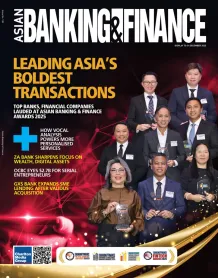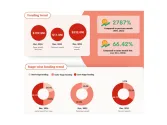
Chinatrust falls flat in wealth management
Q. The Taiwanese banking sector has experienced huge problems in its NII and profit margins in the past, so how will banks like Chinatrust consolidate their positions in the future?
The Taiwanese banking sector has experienced squeezed NII and profit margins during the past 5 to 10 years due to fierce domestic competition, over-liquidity and major industry turmoil including the corporate crisis of 2001 and the cash card and credit card crisis of 2005/06. The performances of Taiwanese banks have been volatile during this period with little growth in scale. Banking consolidations received strong industry and social resistance during the past few years and after the washouts of the two financial turmoils, second-tier private banks with low scale and profitability were gradually merged by global financial institutions such as Citi, ABN Amro, HSBC and Standard Chartered Bank during 2007. We expect the financial industry to consolidate its position even further for better development and performance.
Q. Chinatrust acquired Grand Commercial Bank in 2003, Fengshan Credit Cooperative in 2004 and Hualien Bank in 2007. And with Chinatrust’s ROE predicted to reach 15.2% in 2009 based on earnings growth of 23% as the Hualien Bank merger kicks in, what plans do you have for further acquisitions?
Chinatrust has been trying to adopt aggressive organic acquisition strategies to achieve economic scale. Through the Grand Commercial Bank, Fengshan Cooperative and Hualien Bank M&As, Chinatrust has grown its assets to NT$1.688 billion. Chinatrust will continue to adopt both organic and inorganic strategies that best fit with its various business needs in domestic and overseas markets and pursue growth in asset scale and profitability in the future. Chinatrust’s vision is to become one of the leading regional financial institutions in Asia, with the most effective platform delivering financial products and professional services to key retail and corporate customers.
As a broad-based bank, Chinatrust has itself grown within corporate banking, retail banking and consumer finance business lines, both domestically and internationally. Chinatrust relies on a common set of business strengths to differentiate itself from its competitors across these markets: such as innovative products and service offerings; strong channel networks in Taiwan and across Asia; devoted brand value and client relationships; quality risk management; and efficient operation. We have already built up a top banking franchise in Taiwan by leveraging our extensive client base and our broad distribution network of 144 branches to provide innovative, value-added, and high-margin services to our customers. With these capabilities, Chinatrust is confident about extending its quality services to abroad base of Asia.
Q. How is Chinatrust coping with the inherent effects of a merger combined with the difficulties of banking consolidation, fiercer local competition amongst Taiwan’s wealth management businesses and SMEs, and the scarcity of development opportunities in China?
Each business has been developing its own strategy, risk management, customer service, operations, IT platform and HR talents over the years. At the same time, the three business groups have built up collaboration mechanisms to provide best end-to-end services to customers. These capabilities have helped Chinatrust to better position itself for a faster post-merger integration and business execution whenever the M&A or overseas expansion opportunity comes. In addition, strong client relationship and channel networks, outstanding operational efficiency, and innovative product and service offerings have also helped Chinatrust compete against foreign global players in its home market.
There are three major challenges facing Chinatrust in the next three years: domestic competition and consolidation; overseas expansion; and non-bank diversification. Backed by the strength of their global networks, well-known international players entered the fray battling the financial markets by taking over domestic channels during 2007. We expect domestic competition will be even fiercer in particular around the area of high-net worth individual banking (including private banking and credit cards, wealth management, and SME financing). Due to fierce competition and decreased financing needs of Taiwanese corporates with PRC-based manufacturing in the home market, the ability to extend banking services to offshore markets has become an important element to generate future growth.
Chinatrust will be exploring opportunities in China to capture the abundant business potential and thus a more complete service network in Asia. Chinatrust is also committed to strengthening non-banking services such as security, insurance, asset management, and venture capital. With these business lines, we will be able to provide a variety of financial products and services to domestic and overseas retail and corporate customers whilst achieving diversification of revenue sources for the Group.
Q. Chinatrust still has a long way to go before it can reach the level of DBS or Stanchart, but who do you see as Chinatrust’s current competitors in Taiwan and Asia?
Our major competitors in Taiwan include Mega Financial Holding Company and First Commercial Bank for corporate business, Fubon FHC, Taishin FHC for retail business, and Citibank for credit card business. In the Asian market, Chinatrust has networks in India, The Philippines, Vietnam, Indonesia, Hong Kong, and Japan, with its major business focusing on the corporate banking side, and on Taiwanese corporates at the early stages of development, and then gradually expanding into local business. Chinatrust aspires to play as a regional bank on the same field as DBS or Standard Chartered during the next five to ten years.
Q. Chinatrust’s banking business makes up about 85% of its bottom line, so why aren’t you diversifying into other businesses?
Chinatrust’s priority is to do non-bank diversification. Though our banking business currently contributes about 85% of bottom lines to the Group, collaborations between Chinatrust Commercial Bank and the Chinatrust Insurance Brokers Company have been very successful in producing brokerage commissions and fee income for the Group.
In terms of non-bank diversification, Chinatrust is studying how to strengthen its security business with corporate banking for underwriting together with retail banking for its brokerage business. In addition, other aspects such as expansion into manufacturing insurance, asset management, and share participation in China are just some of the initiatives we are looking at during 2008.
Q. With losses and exposures of NT$30 billion and NT$93.6 billion respectively in Q108, how will Taiwan’s banking sector weather the storm of the US sub-prime crisis?
Due to lesser linkage to the root causes of US sub-prime problems such as decreased housing value and high-risk mortgages, Taiwan will be one of the least affected financial markets, according to unofficial estimations. The total estimated losses incurred by Taiwan’s banking sector was around NT$25 billion, with total exposures of around NT$93.6 billion as of early January 2008.
This could substantially impact on the buying behaviour of individual customers who withdrew from such investments. However, on the flip side, the US sub-prime issues raised risk awareness of general investors and helped to raise the risk premium to a more reasonable level which might just help the banking industry to receive justifiable margins. The impact for Chinatrust has been minimal. Chinatrust Commercial Bank had already recognised 100% of its SIV investment of US$45 million as unrealised losses fully reflecting the falling NAV of that investment. Despite global market turbulence during the second half of 2007, Chinatrust still delivered a pre-tax profit of NT$17.5 billion with 12.05% ROE and 1.04% ROA.
Q. In 2006, Chinatrust’s credit/cash cards dropped to minus 10%. Has Chinatrust recovered from the credit/cash card crisis? Aren’t you concerned about a slowdown in your wealth management business?
Chinatrust has regained its financial strength from the 2005 and 2006 credit/cash card crisis and has maintained its earning quality to remain one of the best financial holding companies in Taiwan. Credit cards will rise to 5% in 2008 and 5% in 2009. Earning quality maintained a leading position amongst all financial holding companies in Taiwan with wealth management fees contributing around 49% of total FHC fee income. The 31 branches inherited from our merger with Hualien Bank will generate annual fee income of NT$ 4.0 billion, translating into pre-tax earnings of NT$2.0bn, assuming a 50% cost–income ratio.
But looking ahead we expect market volatility to continue throughout the year. This may affect the overall performance of our wealth management business. But the benefits from the wealth management business could rise if the effects of an aging society are factored in. However, with the expectation that the financial impact of the credit/cash card crisis will come down to a normal level, this should help to mitigate the likely slowdown in wealth management business. Taking into consideration the results of the Presidential Election, we foresee the economic and financial interactions between the PRC and Taiwan moving in more favourable directions in the near future.


















 Advertise
Advertise










